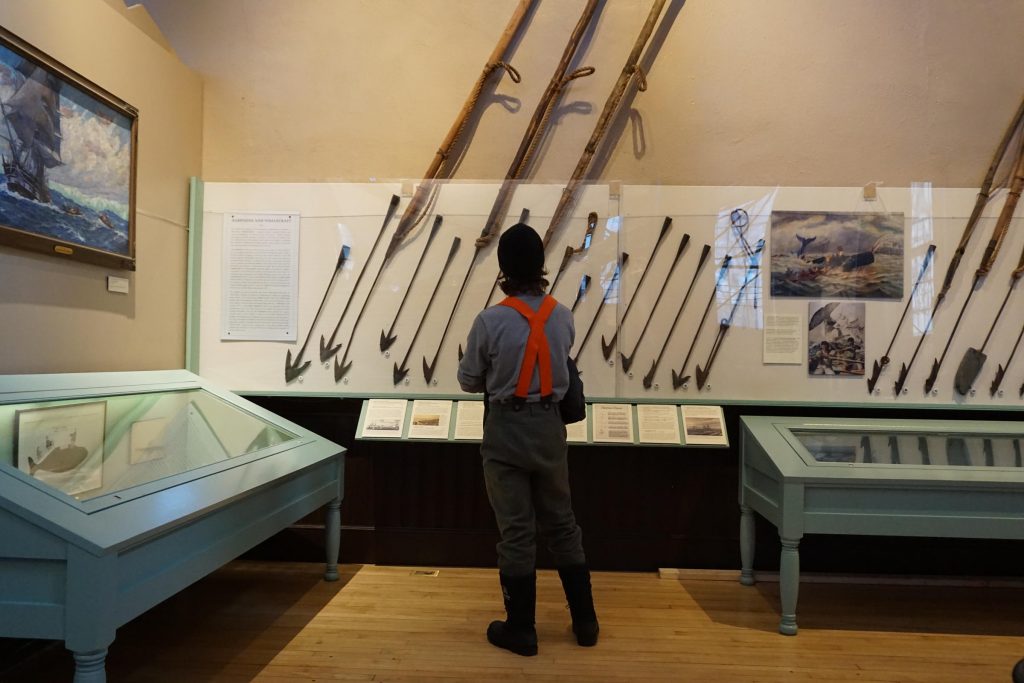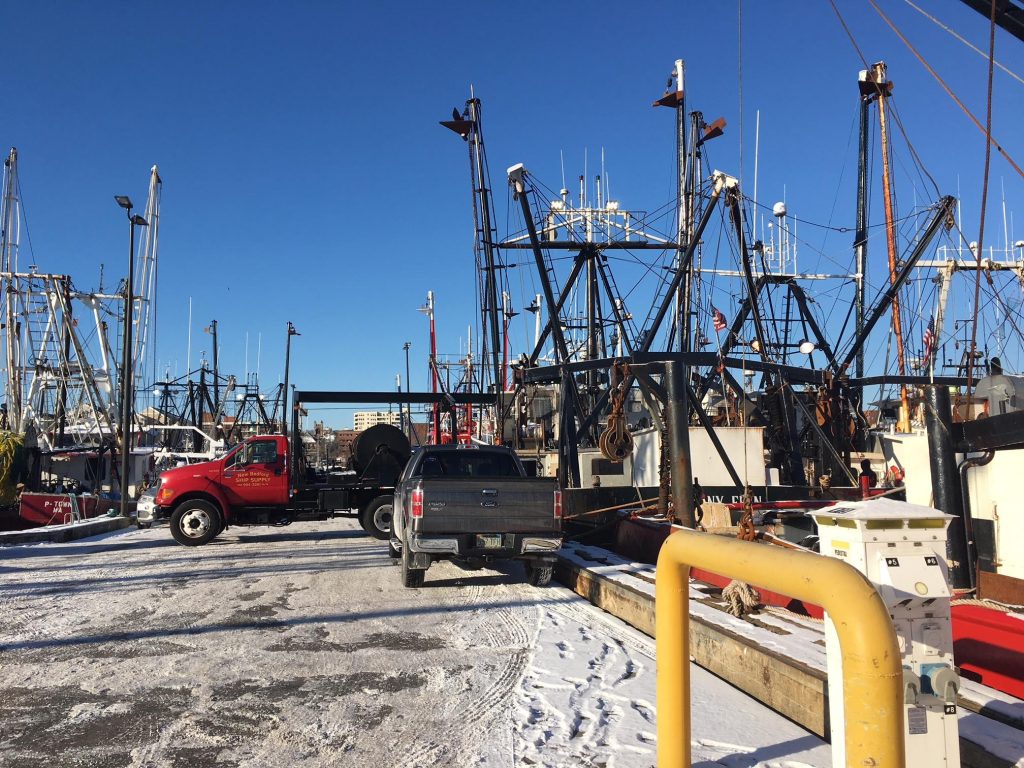Episode 81: Return

New Bedford, Massachusetts is known for its profitable fishing port. It even draws visitors by celebrating Moby Dick, a novel inspired by whalers there. But facing a crackdown on fishing by regulators, the city is starting to look at another source of revenue – offshore wind. We take a look inside the hidden, often lucrative world of Vermont sheriffs, and mourn (or celebrate??) the end of L.L. Bean’s lifetime return policy. Plus: responding to racism on campus through art, and Palestinian storytellers in Boston.
Keeping Tabs on the Sheriff
When Attorney General Jeff Sessions at a speech to the National Sheriffs Association said “The office of sheriff is a critical part of the Anglo-American heritage of law enforcement,” he prompted many shocked observers to wonder where that leaves people of color within that heritage. It’s also thrown a pretty harsh spotlight on the job of sheriff.
But do you even know who your sheriff is?
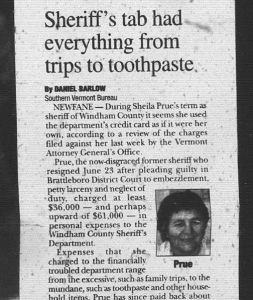
In 2006, an anonymous whistleblower tipped the Vermont state auditor off to financial misdeeds in the Windham County Sheriff’s Department, which was led by Sheila Prue.
If you live in Connecticut, that’s a trick question! County government is nonexistent in the Nutmeg State — that’s why there are no sheriffs — but it’s not very strong in other New England states either. While Maine, New Hampshire, Vermont, and Massachusetts have elected sheriffs, their elections don’t get much attention.
That lead a listener to the Vermont Public Radio podcast Brave Little State to ask: if voters aren’t holding these elected officials accountable, then who is?
VPR investigative reporter Emily Corwin dug in and joins us to share some surprising tales of sheriffs going bad — and virtually getting away with it.
So, did that dog bed you purchased from LL Bean five years ago get chewed by its occupant? Up until last week, you could just take it back and get a replacement for no charge.
But the iconic Maine company is changing its famous unconditional return policy — one that has been a part of the brand since it started more than a century ago.
The change comes as a response to the growing number of customers who have been taking advantage of the policy. Maine Public Radio’s Patty Wight reports.
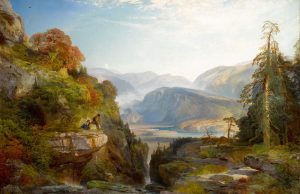
“The Last Arrow,” by Thomas Moran, is one of the works slated for sale by the Berkshire Museum. Image courtesy of Sotheby’s
And there are plenty of complaints about a deal the Massachusetts attorney general struck with Berkshire Museum.
The deal allows, with some conditions, the museum to sell up to 40 works of art — including two Norman Rockwell paintings — to fund renovations and boost its endowment.
A group of the museum’s members said it will press forward in a lawsuit attempting to block the sale. New England Public Radio’s Adam Frenier has more.
A Maritime Past and Future in New Bedford
New Bedford, Massachusetts was on the front page of the New York Times this week. The headline: “A Famed Fishing Port Shudders as Its Codfather Goes to Jail.”
Back in October, fishing magnate Carlos Rafael, also known as “the Codfather,” was sentenced to 46 months in federal prison for mislabeling his catch and money-laundering. But with Rafael behind bars, the men who worked for him are barred from catching groundfish with his boats. Some of Rafael’s boats and permits have even been seized by regulators. And as the Times reports, the ripple effects can be felt across the usually bustling port of New Bedford, which has gone eerily quiet.
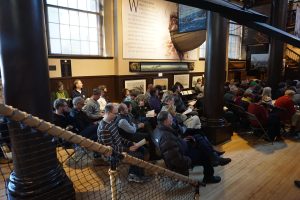
Visitors listen to Moby Dick read aloud, during the annual Moby Dick Marathon at the New Bedford Whaling Museum. (John Bender/RIPR)
Yet while the fishing sector sits in limbo, another industry is just gearing up off Massachusetts’ South Shore — offshore wind.
Right now, the Commonwealth is developing what could be the nation’s first large-scale offshore wind project, and New Bedford wants to be a big part of it. Rhode Island Public Radio’s environmental reporter Avory Brookins takes a look at that city’s bet on offshore wind energy.
In the mid 19th Century, New Bedford was one of the world’s whaling capitals. The whaling industry is long gone, but New Bedford is drawing in fans of the world most famous leviathan. RIPR’s John Bender has the story.
The RIPR newsroom has been exploring New Bedford for their series “One Square Mile,” and there’s lot’s more at ripr.org. RIPR and the University of Massachusetts at Dartmouth are holding a public forum on Wednesday, February 21 called “After the Codfather: The Future of New Bedford’s Fishing Industry.” Admission is free, registration required.
Cultural Catharsis
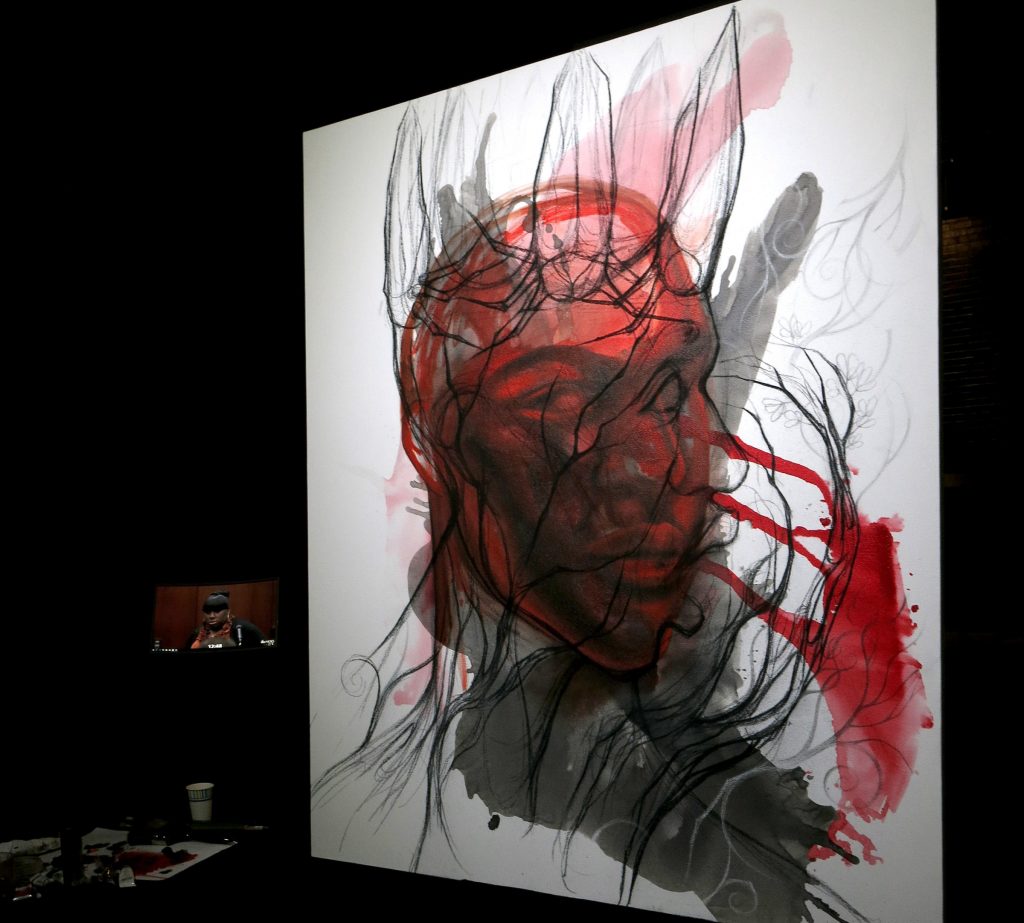
A painting of Trayvon Martin was part of a performance piece by Imo Nse Imeh at Westfield State University. (Jill Kaufman) NEPR
An art professor recently spent four days painting a six-foot-tall portrait of Trayvon Martin, while spectators came and went.
The performance took place at Westfield State University, near Springfield, Massachusetts, where last semester there were numerous reports of racist messages left around campus. New England Public Radio’s Jill Kaufman reports.
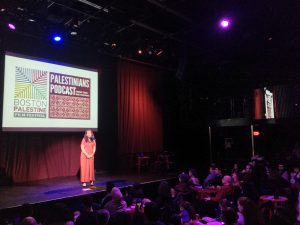
Nadia Abuelezam performs on stage at “Palestinians, Live!” a night of storytelling in Cambridge, Mass, on January 28. Photo by Annie Sinsabaugh
When we hear about Palestinians in the news, it’s usually in the context of conflicts or negotiations with Israel.
With their stories being so highly politicized, the personal narratives of Palestinians don’t often make it to American ears. Nadia Abuelezam, a Palestinian-American living in the Boston area, wants to change that.
In 2015, she launched an event series called Palestinians, Live! featuring true stories told on stage. The stories are later released on Palestinians Podcast, which Nadia also created.
Reporter Annie Sinsabaugh went to a recent Palestinians, Live! event at the Oberon Theater in Cambridge, Massachusetts, where she found not only entertainment but a community.
About NEXT
NEXT is produced at WNPR.
Host: John Dankosky
Producer: Andrea Muraskin
Executive Producer: Catie Talarski
Contributors to this episode: Emily Corwin, Patty Wight, Adam Frenier, Patrick Skahill, Avory Brookins, John Bender, Jill Kaufman and Annie Sinsabaugh
Music: Todd Merrell, Ben Cosgrove, “New England” by Goodnight Blue Moon, “Sama’i” and “Julnar” by Huda Asfour, “September Mountains” by “DrumTamTam”
We appreciate your feedback! Send critique, suggestions, questions, story leads, and diaspora stories to next@wnpr.org.

